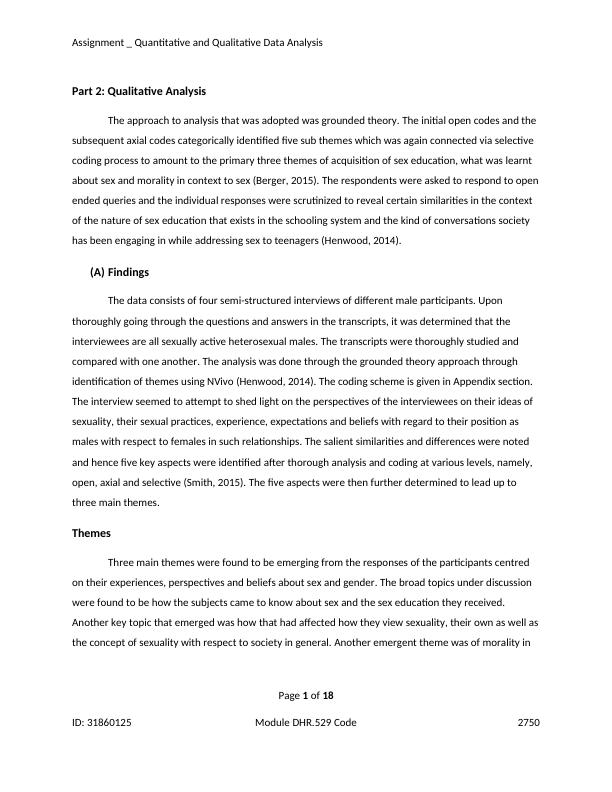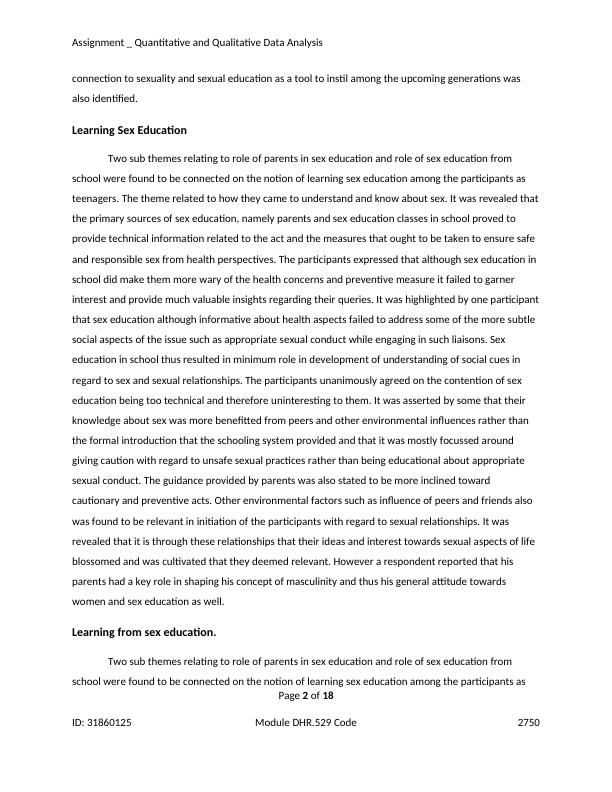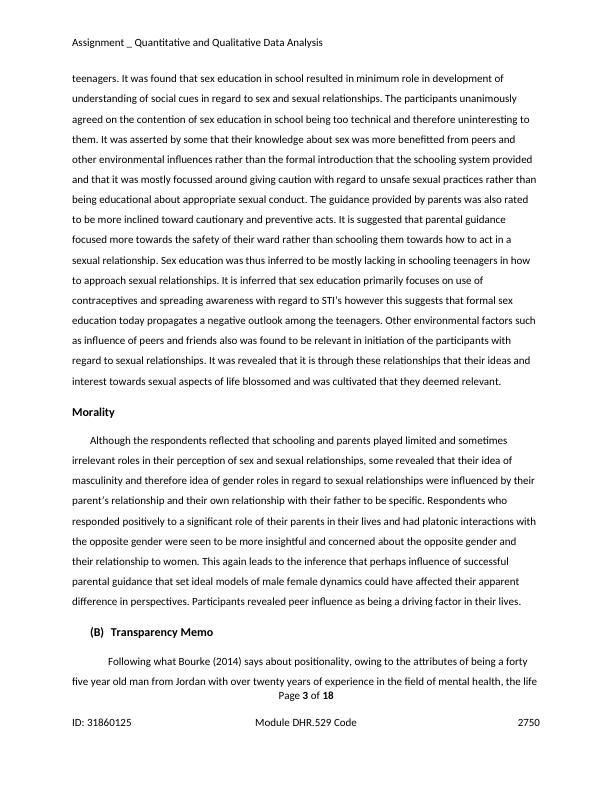Assignment - Quantitative and Qualitative Data Analysis
Present analysis of qualitative data findings and critically discuss challenges of analyzing qualitative data and producing rigorous findings.
17 Pages4998 Words73 Views
Added on 2021-04-24
Assignment - Quantitative and Qualitative Data Analysis
Present analysis of qualitative data findings and critically discuss challenges of analyzing qualitative data and producing rigorous findings.
Added on 2021-04-24
ShareRelated Documents
Running head: Assignment _ Qualitative Data AnalysisAssignment_ Qualitative analysisName of StudentName of UniversityAuthor note

Assignment _ Quantitative and Qualitative Data AnalysisPart 2: Qualitative AnalysisThe approach to analysis that was adopted was grounded theory. The initial open codes and the subsequent axial codes categorically identified five sub themes which was again connected via selective coding process to amount to the primary three themes of acquisition of sex education, what was learnt about sex and morality in context to sex (Berger, 2015). The respondents were asked to respond to openended queries and the individual responses were scrutinized to reveal certain similarities in the context of the nature of sex education that exists in the schooling system and the kind of conversations society has been engaging in while addressing sex to teenagers (Henwood, 2014).(A)FindingsThe data consists of four semi-structured interviews of different male participants. Upon thoroughly going through the questions and answers in the transcripts, it was determined that the interviewees are all sexually active heterosexual males. The transcripts were thoroughly studied and compared with one another. The analysis was done through the grounded theory approach through identification of themes using NVivo (Henwood, 2014). The coding scheme is given in Appendix section. The interview seemed to attempt to shed light on the perspectives of the interviewees on their ideas of sexuality, their sexual practices, experience, expectations and beliefs with regard to their position as males with respect to females in such relationships. The salient similarities and differences were noted and hence five key aspects were identified after thorough analysis and coding at various levels, namely, open, axial and selective (Smith, 2015). The five aspects were then further determined to lead up to three main themes. ThemesThree main themes were found to be emerging from the responses of the participants centred on their experiences, perspectives and beliefs about sex and gender. The broad topics under discussion were found to be how the subjects came to know about sex and the sex education they received. Another key topic that emerged was how that had affected how they view sexuality, their own as well asthe concept of sexuality with respect to society in general. Another emergent theme was of morality in Page 1 of 18ID: 31860125Module DHR.529 Code2750

Assignment _ Quantitative and Qualitative Data Analysisconnection to sexuality and sexual education as a tool to instil among the upcoming generations was also identified.Learning Sex EducationTwo sub themes relating to role of parents in sex education and role of sex education from school were found to be connected on the notion of learning sex education among the participants as teenagers. The theme related to how they came to understand and know about sex. It was revealed thatthe primary sources of sex education, namely parents and sex education classes in school proved to provide technical information related to the act and the measures that ought to be taken to ensure safe and responsible sex from health perspectives. The participants expressed that although sex education in school did make them more wary of the health concerns and preventive measure it failed to garner interest and provide much valuable insights regarding their queries. It was highlighted by one participantthat sex education although informative about health aspects failed to address some of the more subtle social aspects of the issue such as appropriate sexual conduct while engaging in such liaisons. Sex education in school thus resulted in minimum role in development of understanding of social cues in regard to sex and sexual relationships. The participants unanimously agreed on the contention of sex education being too technical and therefore uninteresting to them. It was asserted by some that their knowledge about sex was more benefitted from peers and other environmental influences rather than the formal introduction that the schooling system provided and that it was mostly focussed around giving caution with regard to unsafe sexual practices rather than being educational about appropriate sexual conduct. The guidance provided by parents was also stated to be more inclined toward cautionary and preventive acts. Other environmental factors such as influence of peers and friends also was found to be relevant in initiation of the participants with regard to sexual relationships. It was revealed that it is through these relationships that their ideas and interest towards sexual aspects of life blossomed and was cultivated that they deemed relevant. However a respondent reported that his parents had a key role in shaping his concept of masculinity and thus his general attitude towards women and sex education as well. Learning from sex education.Two sub themes relating to role of parents in sex education and role of sex education from school were found to be connected on the notion of learning sex education among the participants as Page 2 of 18ID: 31860125Module DHR.529 Code2750

Assignment _ Quantitative and Qualitative Data Analysisteenagers. It was found that sex education in school resulted in minimum role in development of understanding of social cues in regard to sex and sexual relationships. The participants unanimously agreed on the contention of sex education in school being too technical and therefore uninteresting to them. It was asserted by some that their knowledge about sex was more benefitted from peers and other environmental influences rather than the formal introduction that the schooling system provided and that it was mostly focussed around giving caution with regard to unsafe sexual practices rather than being educational about appropriate sexual conduct. The guidance provided by parents was also rated to be more inclined toward cautionary and preventive acts. It is suggested that parental guidance focused more towards the safety of their ward rather than schooling them towards how to act in a sexual relationship. Sex education was thus inferred to be mostly lacking in schooling teenagers in how to approach sexual relationships. It is inferred that sex education primarily focuses on use of contraceptives and spreading awareness with regard to STI’s however this suggests that formal sex education today propagates a negative outlook among the teenagers. Other environmental factors such as influence of peers and friends also was found to be relevant in initiation of the participants with regard to sexual relationships. It was revealed that it is through these relationships that their ideas and interest towards sexual aspects of life blossomed and was cultivated that they deemed relevant.MoralityAlthough the respondents reflected that schooling and parents played limited and sometimes irrelevant roles in their perception of sex and sexual relationships, some revealed that their idea of masculinity and therefore idea of gender roles in regard to sexual relationships were influenced by their parent’s relationship and their own relationship with their father to be specific. Respondents who responded positively to a significant role of their parents in their lives and had platonic interactions with the opposite gender were seen to be more insightful and concerned about the opposite gender and their relationship to women. This again leads to the inference that perhaps influence of successful parental guidance that set ideal models of male female dynamics could have affected their apparent difference in perspectives. Participants revealed peer influence as being a driving factor in their lives. (B) Transparency MemoFollowing what Bourke (2014) says about positionality, owing to the attributes of being a forty five year old man from Jordan with over twenty years of experience in the field of mental health, the lifePage 3 of 18ID: 31860125Module DHR.529 Code2750

End of preview
Want to access all the pages? Upload your documents or become a member.
